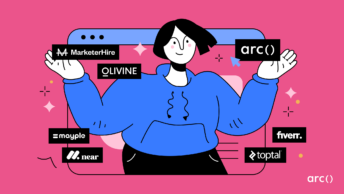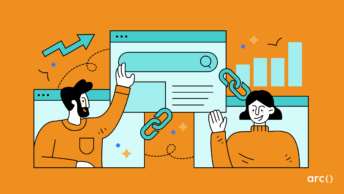Hiring a full-time in-house marketer costs an average of $101,000 a year. But here’s the kicker: 37% of marketers admit they lack the skills to deliver results. Why pay more for less?
Outsourcing changes the game. You get access to top talent paid only by the hour or project focused on delivering results, not draining your budget. It’s like having an expert team on call ready to drive results.
This guide will help you outsource smartly, save money, and pick the right fit between agency, freelancer, or full-time hire.
Looking to hire expert marketers? Explore our network of vetted talent to:
⚡️Hire 4x faster by skipping the manual search
⚡️Save up to 80% with top global hires
⚡️Get real human support from our team
Hire top marketing experts now →
What it means to outsource marketing
Instead of hiring in-house, you hire external professionals or agencies to handle digital marketing, content creation, SEO, social media, and ads. You get specialized skills without the hassle of recruiting or training a team.
For industries like software and fintech, it’s a total breakthrough. These fields demand cutting-edge strategies and expertise. Outsourced marketers create campaigns that connect with your audience and keep up with trends and regulations.
Best of all? You stay focused on what you do best: innovating and building great products. While they handle your marketing, your team refine ideas, launch features, and stay ahead in a competitive market.
Options for marketing outsourcing
When considering outsourcing your marketing, several options are available, each offering distinct benefits and limitations. Here’s a breakdown of the most common choices:
Freelance Marketers
Freelancers are independent professionals who handle specific tasks like content creation, SEO, or social media management. Freelancers work on a project basis, offering flexibility and cost-effectiveness for marketing tasks like blog posts, SEO strategy, or one-time campaigns.
Pros and Cons of Freelance Marketers
| Pros | Cons |
|---|---|
| Flexibility to scale up or down depending on project needs | Limited capacity for complex or large-scale strategies |
| Direct communication makes sharing your vision easier | Specialized in specific areas but not suited for full-service needs |
Digital marketing agencies
Agencies are full-service teams that manage every aspect of marketing, from strategy to execution. Their expertise across multiple channels makes them well-suited for large-scale projects, ongoing campaigns, or long-term strategic partnerships.
However, Devin Bramhall, former CEO of the content marketing agency Animalz, advises caution for early-stage startups. She explains, “I recommend early-stage startups avoid working with agencies unless they already have a marketer on staff (which they usually don’t). Agencies are like employees—they need direction, feedback, and collaboration to deliver results you’ll be happy with.”
Pros and Cons of Digital Marketing Agencies
| Pros | Cons |
|---|---|
| Expertise across multiple marketing channels like SEO, PPC, and content marketing | Higher costs, which may not suit smaller businesses or tight budgets |
| Tailored, long-term strategies aligned with business objectives | Comprehensive services can be excessive for limited needs |
| Scalable solutions with access to advanced marketing tools |
A better option – Arc
Arc offers a hybrid solution that combines the strategic expertise of agencies with the flexibility and cost-effectiveness of freelancers. Whether you need a single specialist or a full team, Arc helps you find the right talent to scale your marketing efforts effectively and affordably.
Christine Orchard, Head of Marketing at Arc, shares her experience: “I don’t just promote our platform—I rely on it. When our team needed specialized skills, I turned to Arc to find a freelance SEO specialist who perfectly matched our needs. It was like gaining agency-level expertise with the confidence of a trusted vetting process, all while maintaining the flexibility to adapt as our goals evolved.”
Arc’s unique offerings
- Connect with top freelance and full-time remote marketers pre-vetted for skills and languages
- Instantly view top matches with Arc’s HireAI, skipping the long review process
- Access talent in 190+ countries and save up to 80% vs. traditional hiring
- Hire confidently with expert support from our recruiters at every step
Pros and cons of outsourcing marketing
Outsourcing marketing can be a secret weapon, saving you time, cutting costs, and driving growth. But it’s not foolproof. The right partner improves your brand; the wrong one leaves you cleaning up the mess.
To make it work, you need to weigh the pros and cons. Here’s what outsourcing can do, where it excels, and where to be cautious.
Benefits of outsourced marketing
Outsourcing marketing can give your business a competitive edge. From saving time and cutting costs to accessing expert skills and tools, it’s a smart way to improve your marketing without overloading your team. Here are the benefits of outsourcing marketing strategy:
| Consideration | Outsourcing advantage | In-house limitation |
|---|---|---|
| Saving time and resources | Frees up your team to focus on core tasks like product development and customer support. | The team spends significant time managing campaigns, content creation, strategy, and other responsibilities. |
| Cost efficiency | Pay only for the services you need, reducing overhead costs. | Higher costs for recruiting, training, and maintaining staff, especially for specialized roles. |
| Access to expertise | Agencies and freelancers bring specialized skills, often in niche areas like cybersecurity or AI. | Expertise depends on the skill set of the hired team, which might require additional training for niche skills. |
| Fresh perspectives | External teams bring creative, outside-the-box ideas and solutions. | In-house teams may become too close to the brand, making it harder to see new opportunities. |
| Scalability and flexibility | Easily scale efforts up or down based on business needs, such as product launches or seasonal campaigns. | Scaling requires hiring new staff or reassigning current employees, which takes time and adds costs. |
| Tools and resources | Gain access to advanced tools like analytics platforms and automation software without large upfront investments. | Limited to tools the company can afford, which may not match the capabilities provided by outsourcing partners. |
Potential challenges of outsourcing marketing services
Outsourcing marketing can offer great benefits, but it also presents some challenges. Here’s a look at the key concerns and how to manage them.
| Challenge | Best practices |
|---|---|
| Maintaining brand consistency | Maintaining brand consistency while outsourcing is manageable with planning. Create a style guide with voice, tone, visuals, and messaging, plus examples of past campaigns. Regular check-ins ensure your external team aligns with your vision, keeping your brand consistent across campaigns. |
| Data security and privacy concerns | Sharing information is part of outsourcing, but protecting it is simple. Use NDAs and ensure your partner follows secure storage and encryption practices. Share only what’s necessary. Setting clear boundaries protects your data while enabling your team to deliver results. |
| Managing expectations and communication | Clear communication is key to successful outsourcing. Set specific goals, timelines, and deliverables upfront so everyone knows what success looks like. Regular updates and feedback sessions catch issues early and keep everything aligned. Solid communication ensures smooth projects and fewer headaches. |
| Legal and contractual considerations | Ensure your contract includes intellectual property rights and clauses for regulatory compliance if customer data is involved. Set clear termination terms so both parties know the exit conditions upfront. For simplicity and reduced risk, consider an Employer of Record (EOR) to handle contracts, compliance, and local regulations. |
| Cultural and communication barriers | Working across time zones can be tricky, but it’s manageable. Choose partners experienced with diverse teams and aware of cultural nuances to avoid missteps. Set overlapping hours for real-time chats and use tools like video calls to stay connected. Clear communication ensures smooth collaboration. |
When should and shouldn’t you outsource marketing?
Outsourcing marketing is all about timing. Whether you need fresh expertise, more capacity, or specialized skills, it can be a smart move. But sometimes, keeping things in-house makes more sense. Let’s break down when outsourcing works best and when it doesn’t.
When to outsource digital marketing
Let’s be honest, you can’t do it all. Marketing often gets sidelined between running a business, building a product, and managing a team. It might be time to outsource if you’re juggling too much and feeling like a one-person circus.
Limited resources
Picture this. You’re a startup buried in product development, and your marketing plan is “we’ll figure it out later.” Sound familiar? Outsourcing gives you access to experienced pros without the cost of an in-house team. It’s like having a VIP marketing squad at a fraction of the price.
Find a marketing agency or freelancer that specializes in your industry. They’ll already know the challenges and trends, so you can hit the ground running.
Need for scalability
Things are going great, maybe a little too great. You’re growing fast or prepping for a big seasonal push, and your in-house team is already running on fumes. The last thing you want is to overload them (or watch them combust).
Outsourcing gives you the flexibility to ramp up marketing without a long-term commitment. It’s fast, efficient, and lets your team focus on what they do best.
Bring in external help for tasks like content creation or paid ads while your internal team handles the critical work.
Specialized expertise
You’re launching a new product and need some serious marketing muscle. SEO, PPC, and content strategy might not be your team’s strengths. And let’s be honest, there’s no time to become an expert overnight.
Outsourcing brings in specialists who know exactly what works (and doesn’t). You get top-tier expertise fast, without the learning curve.
Find agencies or freelancers with a proven track record in your niche. For example, if it’s a tech product, work with a digital marketing agency that understands your industry.
Overburdened in-house teams
Here’s a scenario we all know too well. Your marketing team is juggling content creation, social media, and everything. If your team is drowning in tasks, outsourcing can be a lifesaver.
External experts can take over specific campaigns, freeing up your team to focus on strategy, customer engagement, or maybe just catching their breath.
Pinpoint where your team struggles most (like SEO, paid ads, or design) and bring in external help for those tasks. It’ll give your in-house team the bandwidth to excel at what they do best.
When to keep digital marketing in-house
Outsourcing can seem like a quick fix, but sometimes, keeping it in-house is smarter. Certain situations call for the expertise and control only an internal team can offer. Here’s when to keep marketing operations under one roof.
Specialized industry knowledge
For highly technical or niche products, in-house teams are often the better choice. They understand your industry, speak your customers’ language, and create campaigns that truly resonate.
Outsourcing can risk misaligned messaging. No matter how skilled, external teams might not fully capture your product’s complexity or tone, leading to marketing campaigns that feel off.
If your marketing requires deep technical knowledge, an in-house team can create authentic, well-informed strategies that align seamlessly with your product and audience.
Sufficient budget for an in-house team
Building an in-house marketing team makes sense if your budget allows. It’s not about junior hires but skilled professionals who can shape your brand and execute targeted strategies.
While outsourcing may seem cheaper, relying on external agencies in the long term can be pricey. When finances permit, invest in a dedicated team to drive your vision and avoid recurring outsourcing costs.
Want full control over marketing efforts
An in-house team might be your best bet if you value direct control. You make the decisions, adjust strategies in real-time, and don’t have to wait for updates or approvals from an agency. It’s all in your hands, with no delays.
Outsourcing means giving up some control. If quick decisions and flexibility are critical, an in-house team ensures you stay agile and aligned with your goals.
8-step guide to outsourcing your marketing
Outsourcing marketing can transform your business, but success depends on starting smart. It’s like handing off the baton to experts while keeping a firm grip on the overall direction. Here’s how to make it work.
1. Identifying your needs and goals
First things first, figure out what you want to achieve. Do you need more traffic? Better leads? Or maybe just a brand presence that turns heads? Set clear, measurable goals to keep your efforts on track.
Next, decide what to outsource. Is it content creation, social media strategy, or paid ads? By identifying your biggest challenges, you’ll know exactly where to focus.
Start small. Hand off the tasks that drain your time, then reassess as you grow. Outsourcing is meant to evolve with your needs.
2. Set a budget
Start by figuring out what you can comfortably spend. Be realistic. You don’t need a massive budget, but quality work does require a fair investment.
Think about all the costs: hourly rates, project fees, tools, and revisions. Know exactly what you’re paying for to avoid surprises. Consider hiring global talent from lower-cost regions for cost savings.
Divide your budget into channels like content, ads, and SEO. This makes it clear where your money is going. And remember, spending a little more upfront can save you headaches.
3. Decide if you’ll go the agency or freelancer route
Now, it’s time to choose your marketing partner. Agencies are great for full-service support. They’ve got teams, tools, and expertise to cover everything, but they usually come with a bigger price tag.
Freelancers, on the other hand, are perfect for specific tasks. They’re flexible and more affordable, but you’ll need to manage the coordination yourself.
For smaller needs, go with a freelancer. A full-service marketing agency might be the way to go if you’re after a broader strategy. And remember, nothing is set in stone; you can always switch later.
4. Researching and shortlisting candidates
Now comes the fun part: finding your marketing match. Look for agencies or freelancers with experience in your industry, whether it’s healthcare, e-commerce, manufacturing, or something else. If they’ve worked with companies similar to yours, that’s a great sign.
Always check their references and past work to make sure they’re legit. Don’t shy away from asking tough questions. This is a partnership, not a blind date.
Also, with data privacy a top concern, make sure they follow consent-based marketing. This ensures your audience willingly engages with your brand, leading to better trust and higher-quality leads.
With Arc, you can skip the hassle of sifting through endless profiles. We connect you with experienced freelance marketers who fit your needs, saving time and helping you find top talent efficiently.
5. Evaluating proposals and fit
You’ve got the proposals; now it’s time to see if they’re the right fit. Start with their expertise. Do they understand your industry and needs? This isn’t the moment for generalists.
Next, check the cost. Does it fit your budget, and more importantly, is the value worth it? A low price might sound great, but quality matters more.
Cultural fit is just as important. Will they get your vibe and adapt to your communication style? Ask how they handle challenges and define success to see if they align with your goals.
6. Making the decision
Alright, you’re at the finish line. It’s time to make the call. Weigh the pros and cons. Does the agency bring the experience you need, or does the freelancer offer the flexibility you want? Be honest about what your business needs right now.
But think beyond the immediate project. Can you see yourself working with them long-term? A strong partnership should feel more like a good relationship than a quick fix.
Don’t just focus on the first project. Ask yourself if they can handle your future goals and grow with you. If the answer is yes, you’re probably on the right track. If not, keep looking.
7. Onboard the outsourced marketing partner
This is where things either click or crash. Start by setting clear expectations. Don’t leave room for confusion; give your team all the details they need to hit the ground running.
Ensure your outsourced marketing team and in-house crew work together, not against each other. Regular check-ins and open communication are essential to keep everyone aligned.
Think of it like a group project. Keep everyone in the loop and share the info they need. It’ll save you a ton of hassle later.
8. Monitor progress and performance
Now that you’re up and running make sure you’re on track by setting clear KPIs. What does success look like, lead generation or conversions? Define your goals to know when you’re winning.
Use tracking tools to monitor performance. Set up analytics platforms and check in regularly. Weekly or bi-weekly meetings will keep everyone aligned and help you adjust quickly.
Let the data guide you. If the numbers don’t add up, pivot. These steps will help you stay on course and keep your marketing moving forward.
The costs of outsourcing digital marketing
Outsourcing your digital marketing can vary in cost based on your specific needs and the professionals you choose to work with. Here’s a quick overview:
Freelancers
These independent professionals typically charge between $12 and $35 per hour, depending on their expertise and the complexity of the task. Freelancers are ideal for specific marketing tasks like SEO, content creation, or email marketing.
Agencies
Hiring a digital marketing agency typically costs $2,500 to $12,000 per month. They offer comprehensive digital marketing services like marketing strategy, campaign execution, and analytics, making them ideal for businesses needing a full-service approach.
How to choose the right marketing outsourcing partner
Choosing the right marketing partner is like a first date; you’re hoping for a great match, but the wrong one can derail your goals. Get it right, and you’ll have a partner who helps you crush your objectives.
Your options range from full-service agencies that do it all to freelancers with deep expertise in specific areas. It’s all about finding the fit that suits your needs, budget, and long-term vision. Here’s how to make it happen without the stress.
Key factors to consider
Outsourcing your marketing is like picking a co-pilot for a long road trip. You need someone who knows the route, handles detours, and stays calm under pressure. Let’s break down the key factors to ensure you choose the right partner.
Expertise and track record
Experience matters. A shiny website is nice, but have they actually delivered results? Look for case studies, testimonials, and success stories showing they can support their claims. A solid history in the business usually means they’ve learned how to handle challenges.
If they specialize in your industry, that would be even better. Whether it’s B2B SEO or e-commerce social media advertising, specialists can hit the ground running instead of figuring things out.
Services and capabilities
Think about what you need now and what you might need a year from now. Can this partner handle it all, or will you juggle multiple agencies like a circus act?
Ideally, you want someone who can scale with you. Will your business adapt without missing a beat if it grows or shifts? Look for services that align with your vision, from marketing strategy to execution.
Compatibility and communication
You know that feeling when someone says they “get it,” but you know they really don’t? That’s what you want to avoid. Your digital marketing experts should follow your team’s style and be flexible.
Are they easy to work with? Do they update you with reports and respond quickly when needed? Good communication ensures you stay on the same page and avoid unnecessary headaches.
Budget and ROI
Money matters, but don’t let a low price fool you. The cheapest option is often, well, cheap. If you’re paying pennies, expect penny-level quality. Instead, focus on the value. Are they offering a clear return on investment?
Ask for transparent pricing and check for hidden fees in the fine print. It’s all about balancing what you can afford with what will deliver results.
Steps to vet an outsourced marketing partner
Picking the right outsourced marketing partner isn’t like swiping right on a dating app, though it might feel that way. It’s not just about a shiny profile; there’s more to a good match than looks. Let’s break down how to choose the right partner for your needs.
Step 1: Review their portfolio and client feedback
Start with their past work. Check out their portfolio to see if they’ve tackled challenges like yours. Are they experienced in your industry or something similar? If they’ve helped businesses like yours, that’s a great sign.
But don’t just take their word for it. Dive into reviews and testimonials for the real story. These will give you an inside look at client satisfaction and whether they deliver results beyond the fluff.
Step 2: Ask questions during initial meetings
This is your chance to get them talking and show them you’re serious. A few solid questions to ask:
- How do you approach strategy development?
- You want to know they have a method, not just an idea.
- Can you share examples of achieving measurable results?
- Look for tangible evidence they’ve moved the needle in real-life scenarios.
- How do you handle communication and reporting?
- Will they keep you updated, or will you be left guessing what’s going on?
Pay close attention to their answers. If they’re vague or avoid specifics, it’s a red flag. You’re not just looking for smooth talk; you want a partner who can back up their promises.
Step 3: Request a trial project or proposal
If you’re unsure about committing long-term, start small. Request a trial project or tailored proposal to test the waters. It’s a low-pressure way to evaluate their approach, communication, and execution. Plus, it helps you spot potential red flags early and see if they fit your goals.
How Arc Can Help You Outsource Marketing Successfully
There are many options for outsourcing marketing, but finding the right match is hard.
Luckily, Arc makes it easier. We take the stress and guesswork out of the process, helping you find the perfect marketers quickly and efficiently.
| Feature | How it helps |
|---|---|
| Access vetted talent | No more sifting through endless resumes. Arc connects you with top remote marketing professionals who’ve been carefully vetted. |
| Quick matching | Need someone fast? Arc’s HireAI finds the perfect candidate in seconds. Yep, seconds. |
| Cost savings | Hiring globally means you get high-quality talent at a fraction of the cost. More bang for your buck. |
| Expert support | Arc’s recruiters help guide you through the process, ensuring you find the right fit for your needs—no guesswork required. |
| Diverse skill sets | From SEO to content creation, Arc has talent for every marketing need. You’ll find the exact expertise you need. |
| Seamless integration | You can quickly bring remote marketers into your team without any hassle. It’s like they’ve been with you from day one. |
With all these offerings, The Chamberlin Group, once struggling to find a remote marketing expert, achieved its goals with Arc’s help. In just nine days, Arc found a top marketer, saving costs and delivering campaigns that exceeded expectations.
“Arc helped us hire not just any marketer, but the right marketer.” -Amanda Dinkelmann, Marketing Director at The Chamberlin Group
Final thoughts on how outsourcing marketing drives growth and innovation
Outsourcing marketing can make a big difference for your tech company. It saves time, cuts costs, and gives you access to specialized skills that drive growth and innovation.
Yes, it comes with challenges, but finding the right partner is key. But when done right, outsourcing can supercharge your marketing efforts.
Weigh the pros and cons, and if you’re ready to scale, Arc makes it easy to find top-tier marketing talent. Start your search today and take your business to the next level.








